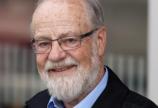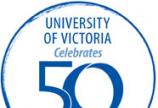Linking Metaphors: Digital Pioneering and English Department Development at UVic
- Nicole Rutherford

Dr. Michael Best enters the room in an energetic flurry, five minutes late, but eager to get started with the interview. He shakes off his jacket and sits down. Filling out the pre-interview papers, he mumbles to himself.
“Interviewer name… yadda yadda, you can fill those parts out… Do I give my consent? Never!” he proclaims, as he signs his initials. He peers up behind his bifocals, “I hope you realize I’m being ironic.”
Best, an emeritus professor at the University of Victoria (also semi-professional oboe player, Shakespeare literatus, and digital pioneer), taught in UVic’s English department for 37 years, from 1967-2004. During this time, he not only became the first person to hold the title of chair of the English department, but was also granted this title three times.
Today he wears a maroon dress shirt. His bright blue eyes glean behind oval glasses, and his neatly combed white hair matches his beard, which he strokes with one hand. He wears a gold wedding ring on his finger, and speaks comfortably with a gentle voice tinged with an Australian accent.
Best came to Victoria after teaching in England for three years, and arrived at UVic in 1967 at a time of great tension and political turmoil. Dropping enrolment rates and anxiety over potential job loss, as well as heated opinions about the granting of tenure, saw three department heads and one interim head come and go. After these transitions, it was decided that the new head should be from within the English department, and rather than be a head, act as chair. Best was elected for this position.
“I think I said the right things in meetings, though I was absurdly young for the position.” He says, “They chose me probably because I was an outsider, and they could forgive if sometimes I spoke out because I was an Aussie, and well, that’s what Aussies do.”
Best served as chair for three years in his first term, with a year break between a second three-year term, and then acted as an interim chair for six months before his retirement in 2004.
“What I did,” he starts, describing his first term, “was build an administrative infrastructure which tried to work very much more on a model of consensus, rather than opposition.” He accomplished this by establishing several smaller committees that would respond directly to the English department in a fashion that is much the same today.
“[One of my greatest accomplishments] was getting the department to be a comfortable, peaceful, productive place to work. I take some credit for doing that…I was young and lucky that the department was ready to do things in a new way. And it worked and I’m proud of that.”
In addition to changing the department’s political structure, Best also insisted that all of the department’s faculty members—despite seniority—should teach at both junior and senior levels, attributing his greatest lessons in education from teaching high school in his hometown of Adelaide, Australia. “You learn how to teach at the higher level by teaching at the lower level. You figure out where to pitch your level of discourse; not too hard for those struggling, or too boring for those who are bright.”
This meant that in the early days of UVic, where two years of English were a prerequisite for anyone gaining a bachelor of arts, almost every student could interact with a tenured professor at some point.
One of Best’s greatest accomplishments, however, would arise from a passion cultivated at a young age: a love for Shakespeare. When he was 12 years old, Best was cast in an amateur theatre company’s rendition of Shakespeare’s King John, playing the part of Prince Arthur. Because of his musical passion, the aural aspects of Shakespeare suddenly came alive to him when portraying this character on stage. “Hearing Shakespeare grow around me, I can still hear exactly as it was.” He recalls, “and I can now tell who were good actors and who weren’t.”
This interest led him away from his family’s scientific background and instead into the arts, though without renouncing the great curiosity he had grown up with.
“My parents were scientists, very good scientists, and curious about the world around them. They required two things: they wanted you to be curious, and they wanted you to collect data and to check your data. That has totally conditioned how I see the world and I think it’s an immensely valuable lesson.”
With this curiosity and some foresight, Best took his passion for teaching and literature and began to pioneer the use of new tool: the computer. Starting with editing manuscripts on the mainframe in the early 90s, he soon became fascinated with computers and the new digital world.
“Then Macintosh came out with HyperCard, and, for the first time, if you clicked on a word it would take you somewhere. And that was amazing. What I realized as soon as I saw that was ‘that’s how I think; I make associations. That’s how poets think; they make metaphors.’ And every metaphor is a hypertext link to a whole frame of reference.”
With this revelation, Best became a forerunner in utilizing the internet for research and teaching, developing staging software for his students, and starting up his most significant project, the Internet Shakespeare Editions (ISE) website, in 1996.
“It’s our responsibility to claim an area of this digital space,” says Best, “We as humanists know how to humanize this space.”
The ISE, one of the foremost websites of its kind in the world is partially funded by UVic as a non-profit project, and hosts a plethora of scholarly contributions and multimedia approaches to all things Shakespeare.
“[It’s all so] hugely exciting. Here I am, long past [the time] when I should be totally devoted to my flower bed or something, just mucking around with it.”
Best recognizes the digitization of the campus as something that will continue to shape the way in which students—and teachers—learn. “What’s happening with digital things is a seismic shift in culture, not just education…[In] less than a generation I think the way we approach the whole process of teaching will change.”
He also believes that some of UVic’s greatest accomplishments have been keeping pace with this digital transformation, like the enormous leap taken in digitizing the UVic Library. “Librarians are expected to do completely different things; [Retired librarian] Marnie Swanson managed to steer the library in that direction and do so with extraordinary grace and foresight. UVic is extremely lucky for the library, and in humanities that really, really matters.”
Another significant point in UVic’s development was the creation of the Humanities Computing and Media Centre (HCMC) and the Computer Assisted Language Learning (CALL) facility, located in the Clearihue Building. The projects, put together by Peter Liddell, provide digital resources and equipment to support professors in research, as well as assist students with language learning.
“[In developing the HCMC] UVic has been an absolute leader in this field and remains one, and that’s something I’m proud of… The HCMC deserves a big star.”
As far as memorable events at UVic go, Best says, “In the 60s we had some quite awesome faculty parties, they were quite something.” Before continuing to praise UVic’s steady evolution, growth, and development.
“If we continue to get bigger, I hope [for UVic] to get bigger with grace… I hope the environment is such that faculty and students can [continue to] really enjoy the work that they do in the pursuit of understanding of knowledge and the things that excite us.”
Best is grateful for his time at UVic, and for the company of his friends and colleagues, both old and new. Although officially retired for eight years, Best is still active with the ISE website, and has just had a proposal accepted to edit an electronic edition of King Lear.
“That’s going to keep me going for ages,” he laughs, “I’m looking forward to just putzing around with that.”
Best’s work with UVic and the ISE can be seen at http://internetshakespeare.uvic.ca/.


